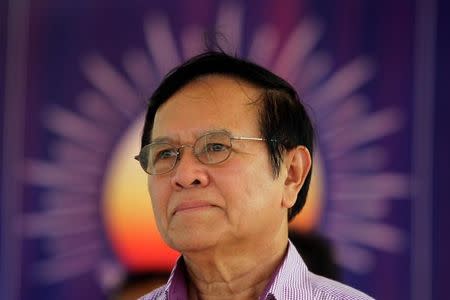Opposition leader's deputy flees Cambodia, fearing for safety
By Prak Chan Thul PHNOM PENH (Reuters) - An outspoken deputy of Cambodia's detained opposition leader fled the country on Tuesday, saying she feared for her safety after Prime Minister Hun Sen threatened further arrests of opposition politicians. Kem Sokha, leader of the opposition Cambodia National Rescue Party (CNRP), was arrested on Sept. 3 and charged with treason in a widening crackdown on critics of Hun Sen, which his opponents say is a ploy to win an election next year. "Without a true opposition and with the wide level of fear, there's no hope for free and fair elections in 2018," Mu Sochua, 63, told Reuters after leaving Cambodia, adding that she "did not feel safe". "Democracy in Cambodia is very rapidly eroding to a point where no other opposing forces are left to fight dictatorship," she said. Government spokesman Phay Siphan said Mu Sochua had "left of her own choice" and he did not know whether authorities had planned to arrest her. Known internationally for campaigns to fight sex trafficking and assert women’s rights, Mu Sochua had been among the most vocal opposition politicians in Cambodia since Kem Sokha was arrested and accused of plotting to take power with U.S. help. She told Reuters last week that around half the CNRP's members of parliament had fled the country in fear. Hun Sen, who has ruled for more than three decades, threatened more arrests of opposition politicians on Monday, attacking them as "rebels in the city" bent on staging a "colour revolution" despite past failures. Western countries have condemned the arrest of Kem Sokha and called for his release, saying the credibility of next year's election is in doubt, but they have given no sign of taking measures against the government. Meanwhile, China has voiced support for the government of Hun Sen, 65. He is a former commander in the Khmer Rouge who later defected from the group whose genocide devastated Cambodia in the 1970s. Strong gains by the CNRP at local council elections in June had pointed to a tough battle for Hun Sen in next year's general election. Despite years of annual economic growth of around 7 percent that have helped transform Cambodia from a failed state, popular anger has grown over inequality and accusations of cronyism. In his first comments since his arrest, Kem Sokha said in a Facebook posting on Monday that he was seeking positive change in Cambodia through the ballot box and not through revolution as charged. One of his three deputies remains in Cambodia. The evidence presented against Kem Sokha so far is a video from 2013 in which he tells supporters that he has support from unidentified Americans for a plan to gain power. (Reporting by Prak Chan Thul; Editing by Amy Sawitta Lefevre and; Clarence Fernandez; Editing by Alison Williams)



